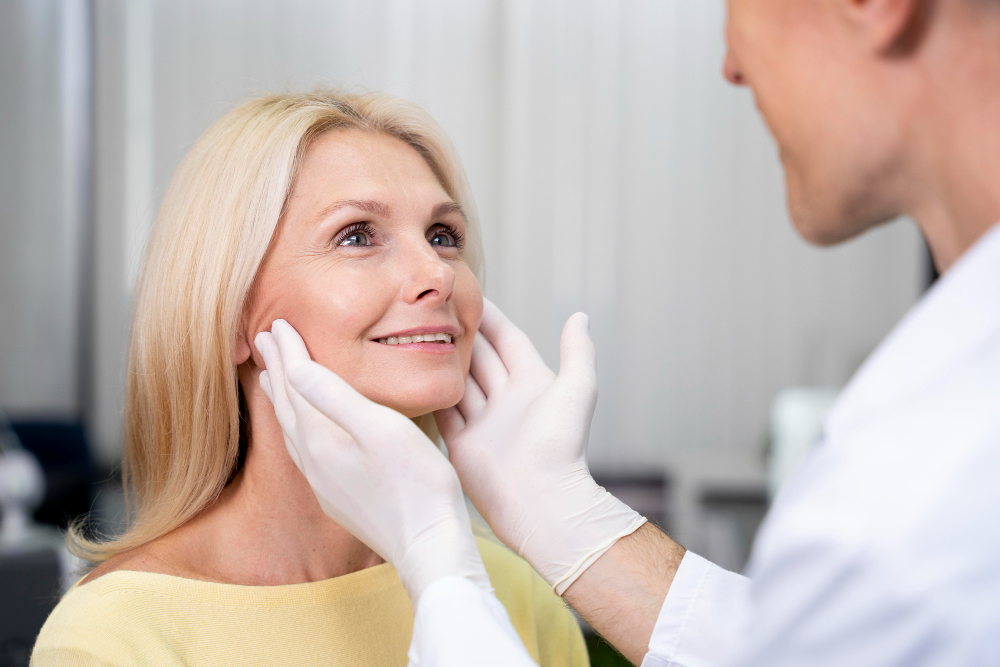Undergoing a facelift can play a big role in creating a youthful, rejuvenated appearance. However, the recovery process can sometimes present unexpected challenges. One concern among patients is when they experience more swelling on one side of the face than the other post-surgery. Understanding why this happens and how to manage it may reduce your anxiety and help you have a smoother recovery.
Why Causes Uneven Facial Swelling After A Facelift?
It’s not uncommon for patients to notice asymmetrical swelling following a facelift. Several factors contribute to this side effect, including:
- Surgical Technique And Tissue Manipulation: During the procedure, Dr. Jindal may need to manipulate tissue differently on each side to create a balanced result. This can lead to varying degrees of swelling.
- Individual Healing Responses: Each side of the face may respond differently to surgery due to variations in blood flow, lymphatic drainage, and tissue characteristics. These differences can result in one side appearing more swollen than the other.
- Sleeping Positions: Post-operative sleeping positions can influence swelling. Favoring one side while sleeping can cause fluid to settle more on that side, leading to increased swelling.
- Activity Levels: Using facial muscles unevenly during recovery, such as chewing predominantly on one side, may contribute to asymmetrical swelling.
Is Uneven Swelling A Cause For Concern?
In most cases, uneven swelling is a normal part of the post-facelift healing process and resolves on its own over time. However, if you also have severe pain, redness, or signs of infection, you should consult with Dr. Jindal.
Tips To Manage And Reduce Swelling
While some degree of swelling is inevitable, there are steps you can take to minimize it:
- Follow Post-Operative Instructions: Stick to your surgeon’s guidelines regarding rest, activity levels, and wound care to help you heal quickly and see the best outcome.
- Elevate Your Head: Keeping your head elevated, especially while sleeping, can help reduce swelling by allowing post-surgical fluid to drain.
- Apply Cold Compresses: Using cold compresses after surgery can constrict blood vessels and reduce swelling. Be sure to follow your surgeon’s recommendations on the duration and frequency of when to use ice or cold compresses.
- Stay Hydrated And Maintain A Healthy Diet: Proper hydration and a balanced diet rich in vitamins and minerals support the healing process and can help reduce inflammation.
- Avoid Strenuous Activities: Avoid exercise and activities that can increase blood pressure and swelling.
- Gentle Massage: Once you get the okay from Dr. Jindal, gentle lymphatic drainage massage can aid in reducing swelling and promoting even healing.
When To Contact Your Surgeon
While uneven swelling is typically not a cause for concern, certain symptoms warrant immediate medical attention, including:
- Persistent or increasing swelling
- Severe pain
- Signs of infection (redness, warmth, pus, or fever).
- Hematoma formation (a collection of blood under the skin, presenting as a firm, painful swelling)
If you have any of these symptoms, reach out to Dr. Jindal immediately so he can address any potential complications.
Understanding Uneven Swelling After A Facelift
Experiencing more swelling on one side of the face after a facelift is a common occurrence and usually part of the normal healing process. Understanding the reasons behind this asymmetry and following recommended post-operative care can help you have a smoother recovery.
If you have questions or concerns about what you should expect after a facelift, don’t hesitate to call the Jindal Institute For Youthful Aging. Dr. Jindal and his team are always ready to answer your questions and address any concerns you have during your facelift recovery.
Call JIYA today at (919) 929-6006. We’re here to support you every step of the way on your path to facial rejuvenation.

